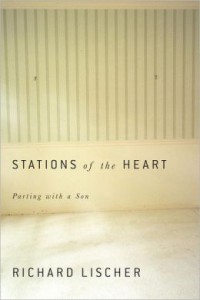
By Richard Lischer*
Reviewed by Jenell Paris
Resident Scholar, Fall 2013
Knopf, 2013, 272 pp.
This book review was first published in the Spring 2014 issue of Bearings Magazine, a semi-annual publication of the Collegeville Institute.
Part elegy, part memoir, part theological exploration, Stations of the Heart might best be described as a love letter exploring the bond between a father and a son, a love that also reaches up to heaven and out to touch the reader.
Richard Lischer’s son, Adam, suffered from a recurrence of cancer when he was 33 years old, and died just three months later. Adam was a lawyer, a recent convert to Catholicism, a new husband, and an expectant father. His wife gave birth to their daughter just days after Adam’s funeral.
Lischer, a pastor, theologian, and professor at Duke Divinity School, has a compelling writing style. Even his book’s acknowledgments deserve a close read. There he recounts that the few people he told about his intention to write this book tended to respond with pursed lips, “as if they knew something about the dangers of remembering that I didn’t understand.” He goes on writing despite these dangers, and the result is a profound gift to his readers.
Lischer masterfully joins the particular and the universal, detailing the specificity of his son and family in a way that invites readers to connect, empathize, and reflect on their own experience.
As the book’s title suggests, its organization relies on and assumes familiarity with the Stations of the Cross. The book’s sections, “The Fountain”, “The Labyrinth”, “Sanctuary”, “Cross”, “The Caves”, and “The Rock”, show the author pausing at, dwelling in, and moving on through the stations of loss and grief. Lischer masterfully joins the particular and the universal, detailing the specificity of his son and family in a way that invites readers to connect, empathize, and reflect on their own experience.
Theologically, the book is careful and wise, never preachy or didactic. There are crosses, churches, and scriptures, but many more daily incarnations of the sacred in meals, babies, touch, and memory. Faith is portrayed neither as a tool of rational explanation nor as a pietistic impulse of the heart, but as a way of living and being in which both rationality and emotion have their place. Lischer has said that good preaching says what needs to be said, and no more. He holds to that ideal as a writer, saying just enough about grief and faith to express his pain, to allow readers to access their own, and to reach toward transcendence in loss and mourning. At times he offers recommendations for churches. For example, he encourages liturgy to welcome everyone. “The liturgy of life offers the kiss of peace to everyone, including the pale, the scabrous, and the very skinny. We name and lament our diseases before God and do not conceal our bodies. We are not ashamed.”
Stations of the Heart is eloquent and poetic not only because Lischer is an excellent writer but also because he seems unafraid of depth, whether the depth of love, loss, faith, or even fear. At one point during Adam’s decline, Lischer finds himself taken hold of by something new, an unnatural energy like adrenaline. He calls it hope. He remembers the biblical promise, “Hope maketh not ashamed”(Romans 5:5), and declares, “I will not be ashamed of my hope. It wasn’t that I believed Adam would be cured, but in defiance of all the evidence I was positive he would survive and our family would remain whole.” Adam dies, but his father doesn’t regret moving beyond his fear of hope, “which is nothing other than the fear of death.”
When I finished the book I looked at the author’s photo on the back cover and said, “Thank you.” This book would be valuable if shared only with Adam’s widow and daughter, but readers, too, will find it a gift that evokes gratitude. It should be read by anyone who has ever lost someone, and by anyone who has ever loved someone. Lischer opens with a description of a father’s love, and concludes, “Love is a harsh comforter, because only love makes genuine loss possible. You can’t lose what you never loved.”
*Richard Lischer led writing workshops at the Collegeville Institute during the summers of 2010 and 2011.
Like this post? Subscribe to have new posts sent to you by email the same day they are posted.



Leave a Reply